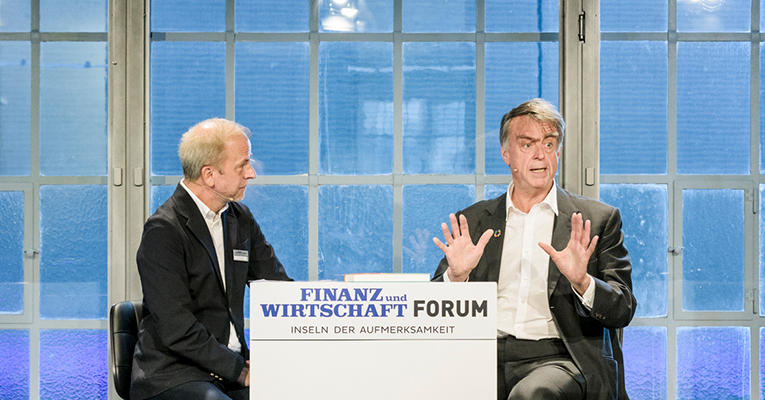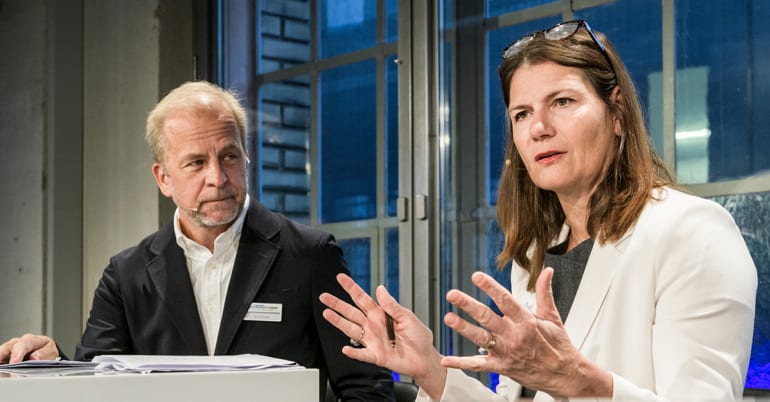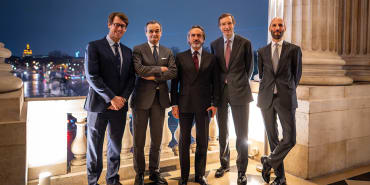The Swiss business landscape is entering a transition era – over the next few years it is thought that as many as 90,000 companies will undergo a change of management.1 For family-owned businesses – where leadership transitions are not merely a matter of practicality but a question of emotional family relationships, identity, and trust – this can be an especially fragile time.
So, how can succession be planned to ensure long-term success? How can firms adapt to a rapidly changing world? And how will the next generation of business leaders differ from their forebears?
The Swiss business landscape is entering a transition era – over the next few years it is thought that as many as 90,000 companies will undergo a change of management
These questions were high on the agenda at Finanz und Wirtschaft’s Generation Summit 2025, the renowned Swiss business and finance newspaper’s first event in a dedicated series of conferences for family businesses.
Held recently in Zurich, and supported by Lombard Odier – itself a family business, owned and managed by its partners and rooted in seven generations of independent ownership since its founding in Geneva in 1796 – the day brought together thought-leaders from the finance sector and senior executives from several leading Swiss firms. These included Dr. Nannette Hechler-Fayd’herbe, CIO EMEA and Head of Investment Strategy, Sustainability, and Research at Lombard Odier; André Hoffmann, Vice President of Roche Holding Ltd and author of The New Nature Of Business, who represents the fourth generation of the Hoffmann family, founders and long-term stewards of Roche; and Philipp Buhofer, Chairman of the Board of Directors of DAX Holding AG, himself at the helm of a longstanding Buhofer family industrial holding. Together, they joined panellists and delegates to explore the challenges facing family-owned businesses in a time of economic and political volatility.
Read also: Family businesses in Switzerland | Lombard Odier
Developing purpose
Opening the event with a keynote interview, André Hoffmann, speaking in his role as Vice President of Swiss multinational healthcare giant Roche and also as a member of the Board of Trustees of the World Economic Forum, began by outlining the importance of developing ‘purpose’.
In 2003, André Hoffmann recalled, he received an unexpected call from a competitor offering to buy Roche in its entirety. After deliberating for a short while he came to a simple conclusion. “We said no – we want to stay independent.”
 Jan Schwalbe, Editor In Chief at Finanz und Wirtschaft and André Hoffmann, Vice Chairman of Roche Holding AG and co-chair of the World Economic Forum
Jan Schwalbe, Editor In Chief at Finanz und Wirtschaft and André Hoffmann, Vice Chairman of Roche Holding AG and co-chair of the World Economic Forum
That surprise telephone call became a moment of epiphany for André Hoffmann and his family. “We realised why we were here. We’re not just shareholders sitting and waiting for dividends. Ownership […] means identifying with the company – what it is and what it does. We gave ourselves a purpose – ‘Doing today what the patient needs tomorrow.’ That purpose helped us enormously as a business and it brought the family together. It’s crucial for a company to have purpose.”
Read also: Transferring family businesses & wealth to the next generation | Lombard Odier
A vehicle for impact
Delegates at the conference heard that, as the next generation prepares to take on leadership roles, that purpose is now being defined by sustainability – both environmental and social. Businesses are no longer viewed merely as vehicles to create wealth, but as a way to have a positive impact on the communities in which they operate, and on the wider world. Where sustainability hadn’t previously been on the agenda – for the Next Gen, it is dominating transition conversations.
Businesses are no longer viewed merely as vehicles to create wealth, but as a way to have a positive impact on the communities in which they operate, and on the wider world. Where sustainability hadn’t previously been on the agenda – for the Next Nen, it is dominating transition conversations
related content.

entrepreneurs: bespoke wealth management.
learn more André Hoffmann explained that developing this bigger purpose can be key to ensuring a family firm’s longevity. “The next question is how to ensure that the generation after next still has influence. Sustainability isn’t just about ‘saving animals’ – it’s about building a system that continually prepares for the next generation.”
“I argue that we shouldn’t look at companies only financially, we should look at their impact on the three big forms of capital we all have – human capital (the individual), social capital (us as a group), and natural capital. Short-term success alone isn’t good enough. For a family firm that has to think across generations, today’s success must be repeatable again and again.”
Agility in the age of Trump
How, though, can firms deliver this purpose when political headwinds have turned against sustainable policies and investments? For Dr. Nannette Hechler-Fayd’herbe, the solution lies in Swiss innovation. “Humans are built to seek solutions – that’s why I’m optimistic. Moments such as these drive innovation, and Switzerland has strong innovative capacity,” she said.
Drawing a parallel with Donald Trump’s shock imposition of tariffs of 39% on Swiss exports to the US, she noted that Swiss firms have a rich history of adaptation, evolution, and agility.
“In 2015, when the SNB removed the EUR/CHF floor, overnight our main export market became much more expensive – 60% of exporters were affected,” she said. “That breeds agility – exploring new markets. Now, with the US relationship looking less friendly, we will pivot towards emerging markets – for many product categories these are the consumer markets of the future.”
related content.

our private banking expertise in switzerland.
learn more Delegates heard that while family firms can sometimes have a reputation for conservatism, their private ownership and often flexible communication structures can enable them to adapt more quickly to a changing environment.
Picking up on Dr. Hechler-Fayd’herbe’s focus on agility, Tanja Zimmermann-Burgerstein, Owner and CEO of Antistress AG-Burgerstein Vitamins, said, “It takes courage to be flexible and keep evolving as the evidence changes. [In family businesses], to bridge across generations you must bring longstanding employees along with you. This is especially important as the world spins faster. Smaller teams can sometimes do this better than huge firms with rigid policies.”
In family businesses, to bridge across generations you must bring longstanding employees along with you. This is especially important as the world spins faster. Smaller teams can sometimes do this better than huge firms with rigid policies
Choosing to lead
A panel moderated by Marie-Christine von Pezold, Managing Director at the Family Business Network Switzerland and consultant for family governance at Lombard Odier, explored another essential element of family business success over the long term – NextGen autonomy.
Delegates heard that the leaders of family businesses – whether intentionally or unintentionally – can create emotional pressure for each new generation to put aside their own desires and commit to the firm. For Philipp Buhofer, Chair and CEO of Buru Holding, this is a mistake. “In my view, anything that endures and succeeds over the long term is built on free choice. That’s key – whatever you do in life shouldn’t be done under pressure. Before joining the business, I did my ‘wander years’ at Metro Cash & Carry. Outside training is essential – you shouldn’t step into a company just because you’re family.”
Reto Candrian, CEO of Candrian gastronomy and hotels group, agreed. “I never planned to join the family firm,” he said. “I wanted to be as independent as possible. I didn’t train as a restaurateur or hotelier – I went into finance. Why mention this? Because being truly independent – financially and practically – was crucial. If it didn’t work out, I had a Plan B. That’s a very healthy foundation.”
Blending tradition with modernity
The panel explained that even the most successful transitions will create upheaval. While this is a necessary part of the adaptability a firm needs, each new generation of leadership must understand and respect the firm’s history and values.
Annemarie Widmer, Owner and CEO of cosmetics and pharmaceuticals firm Louis Widmer, explained, “Internally, we talk about ‘roots and wings’. ‘Roots’ are our values, how we treat employees and customers, and the product promise that we’ve kept at the highest quality for years. ‘Wings’ are the uplift that keep you from resting on your laurels – embracing new technology to be more efficient, expanding our services. Family firms are best-placed to achieve this because we have a multi-generational story.”
Across the day’s conversations, panellists returned to the key themes of family business success – agility and adaptability; the choice made by each new generation; and the need to unify around a guiding purpose. They also spoke of the vital importance of blending tradition with modernity – keeping the best of the family legacy, while adapting and evolving business models to fit a changing world.
Above all, you must have a deep passion for your mission, with long-term, cross-generational thinking. That’s what distinguishes family businesses. Keep that balance and you’ll succeed well into the next generation
Concluding, Marie-Christine von Pezold said, “When it comes to the how – your DNA, values, and philosophy – you must carry those forward with you. They’re a powerful asset for authenticity and identity. When it comes to the what – the business itself – you must adapt and be bold. Above all, you must have a deep passion for your mission, with long-term, cross-generational thinking. That’s what distinguishes family businesses. Keep that balance and you’ll succeed well into the next generation.”








share.